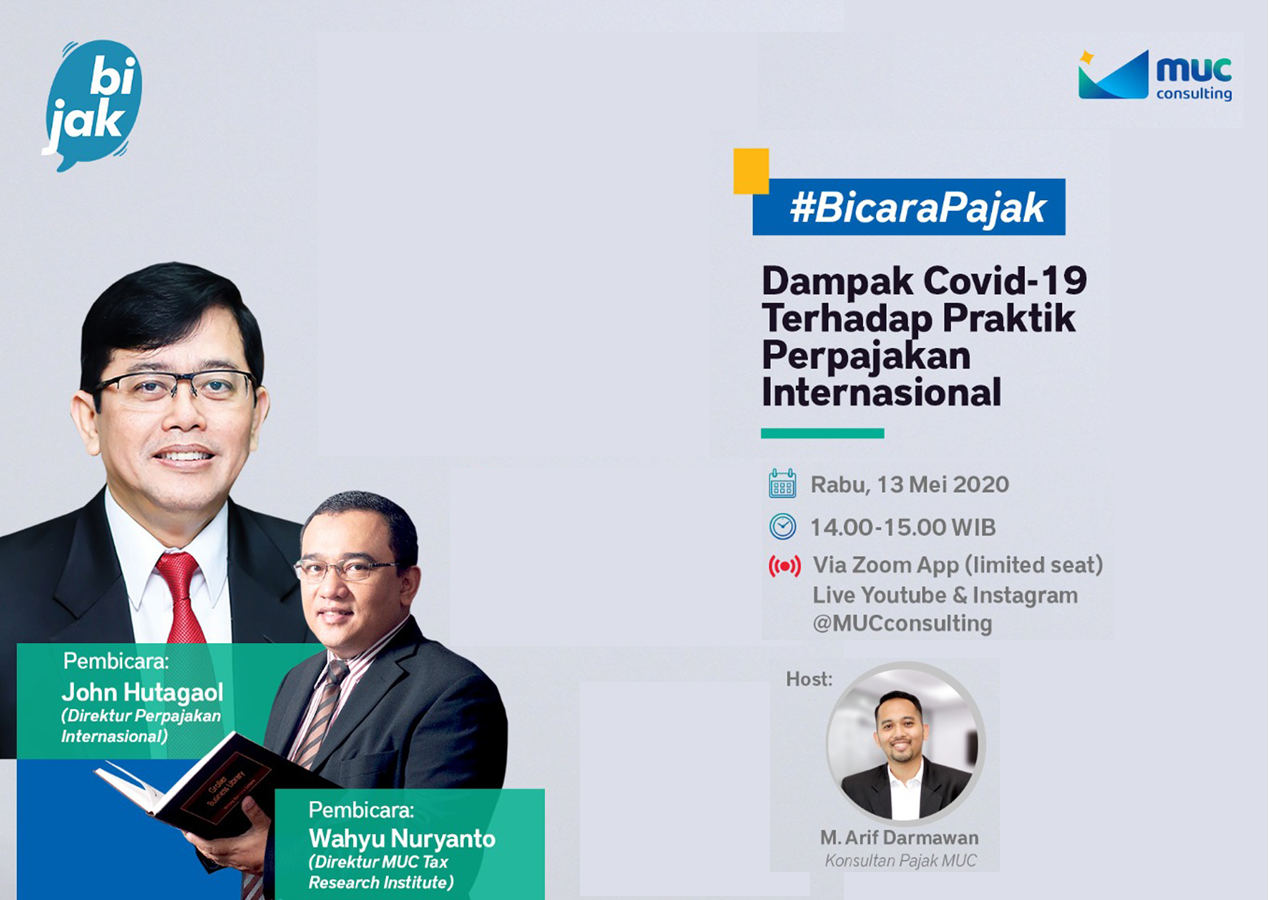Dampak Covid-19 Terhadap Perpajakan Internasional

Pandemi Corona Virus Disease 2019 (Covid-19) telah berdampak luar biasa terhadap perekonomian global, tak terkecuali Indonesia. Bahkan, Organization for Economic Co-operation and Development (OECD) memperingatkan akan bahaya resesi global akibat Covid-19 , yang skalanya diramalkan lebih parah dibandingkan dengan krisis finansial global tahun 2008. Gejalanya sudah terlihat dari pertumbuhan ekonomi China yang minus 6,8% pada kuartal pertama tahun ini.
Kondisi ini kemungkinan akan memukul semua lapisan ekonomi, termasuk perusahaan-perusahaan multinasional yang secara pendapatan akan mengalami penurunan signifikan. Hal ini juga dipastikan akan berdampak terhadap kebijakan transfer pricing, analisis dan dokumentasi laporan transaksi aviliasi grup perusahaan.
Indonesia pun tak luput dari dampak pandemi. Hal itu tercermin dari pertumbuhan ekonomi yang hanya 2,97% pada tiga bulan pertama 2020. Pemerintah memperkirakan perekonomian Indonesia hanya akan tumbuh sekitar 2,3% pada tahun ini, jauh di bawah target 5,3% di APBN 2020. Bahkan, dengan skenario terburuk, kontraksi ekonomi bisa saja terjadi dengan pertumbuhan minus 0,5% jika pandemi tidak bisa diatasi.
Untuk menangkal dampak negatif pandemi Covid-19 terhadap perekonomian, mayoritas negara di dunia kompak menggelontorkan stimulus ekonomi. Demikian pula dengan Indonesia, menyusul kebijakan pemerintah mengalokasikan anggaran tambahan sebesar Rp405 triliun untuk menstimulus perekonomian. Paket insentif perpajakan merupakan bagian dari kebijakan stimulus besar-besaran tersebut.
Menariknya, melalui Peraturan Pemerintah Pengganti Undang-Undang (Perppu) Nomor 1 Tahun 2020, Indonesia juga mempercepat implementasi pemajakan kegiatan Perdagangan Melalui Sistem Elektronik (PMSE). Pemajakan atas transaksi perdagangan online mulai diterapkan mulai tahun pajak 2020, menggunakan opsi Pajak Pertambahan Nilai (PPN), Pajak Pengahsilan (PPh), dan jenis pajak baru sebagai alternatif jika skema PPh terganjal tax treaty.
Sejalan dengan pemajakan PMSE, Pemerintah Indonesia juga memperbarui konsep penentuan nexus, dari yang sebelumnya menjadikan kehadiran fisik (phisical presence) sebagai syarat dalam menentukan suatu entitas menjadi berbasiskan pada kehadiran ekonomi secara signifikan (significant economic presence). Pembaruan konsep nexus ini sejatinya merupakan wacana lama yang berdasarkan agenda OECD akan menjadi konsensus global pada akhir tahun ini.
Dinamika ekonomi dan kebijakan stimulus global yang terjadi belakangan ini—terlebih dengan adanya pandemi Covid-19—menjadi menarik untuk diperbincangkan. Terutama terkait dengan praktik perpajakan internasional yang sedikit atau banyak akan terdampak krisis ekonomi global.
Untuk itu, MUC Consulting yang domotori oleh para konsultan mudanya kembali menginisiasi webinar sebagai platform diskusi online melalui program MUC Bicara Pajak (#MUCBijak). Diskusi online yang ketiga kalinya ini akan mengangkat tema “Dampak Covid-19 Terhadap Praktik Perpajakan Internasional”, yang rencananya akan diselenggarakan pada:
| Hari/Tanggal | Rabu,15 Mei 2020 |
| Waktu | 14.00 s/d 15.00 WIB |
| Platform | Aplikasi Zoom dan Live Streaming di Youtube & Instagram @MUCConsulting |
Diskusi #MUCBijak terbuka untuk umum tanpa dikenakan biaya. Calon peserta bisa melakukan pendaftaran melalui link Bit.ly/MUCBijak3 untuk bisa mendapatkan ID akses Zoom (kuota terbatas), yang akan dikonfirmasi oleh panitia. Bagi calon peserta yang tidak mendapatkan akses Zoom, tetap bisa mengikuti diskusi secara live streaming di channel Youtube dan akun Instagram @MUCConsulting.
Acara ini juga didukung oleh MUC Butterfly Effect, proyek donasi yang tengah difokuskan untuk membantu tim medis dan masyarakat kecil terdampak pandemi covid-19. Melalui acara ini kami mengajak semua pihak untuk menyisihkan sebagian rezekinya guna membantu mereka yang terdampak pandemi Covid-19.


